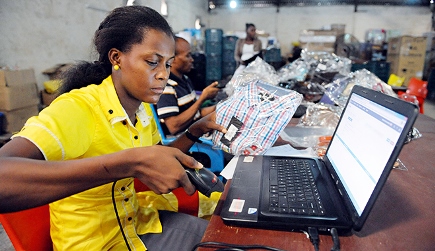Nigeria’s IT and information services industry is 27 percent stronger than the global average based on the size of its economy, ranking 8th out of 40 nations, according to a new industrial specialization report from the Information Technology and Innovation Foundation (ITIF), the leading think tank for science and technology policy.
RELATED: Strengthening financial inclusion in Africa: The role of AI in expanding access to banking services
But while it is still strong in relative terms, Nigeria’s IT and information services industry has weakened significantly since 2010 when it was more than twice as strong as the global average, ITIF found in its Hamilton Index. And Nigeria’s other advanced and strategically important industries perform far below average. From computers and electronics to machine equipment, together they were 71 percent weaker than the global average in 2020, the most recent year for which data is available.
“A nation’s economic and national security increasingly depends on how well it performs in the global competition for market share in a select group of advanced industries,” said ITIF President Robert D. Atkinson, who led the new study. “The IT and information services industry has been a bright spot for Nigeria, but while it accounts for an increasing share of Nigeria’s economy it has produced a shrinking slice of global output. Meanwhile, Nigeria remains far behind the global pace in all other advanced industries.”
Using the latest data available from the Organization for Economic Cooperation and Development (OECD), ITIF’s Hamilton Index ranks 40 countries on their performance in 10 advanced and strategically important industries: IT and information services; computers and electronics; pharmaceuticals and biotechnology; machine equipment; electrical equipment; motor vehicles; other transportation equipment; chemicals; fabricated metals; and basic metals.
To assess nations’ performance relative to the size of their economies, ITIF uses an analytical statistic known as a “location quotient” (LQ), which measures any region’s level of industrial specialization relative to a larger geographic unit—in this case, a nation relative to the rest of the world.
- Nigeria’s LQ across all 10 advanced industries combined was just 0.29, meaning it was 71 percent weaker than the global average based on the size of its economy—ranking 39th out of the 40 countries studied. (See figure 1 below.)
- Nigeria’s LQ in IT and information services was 1.27 in 2020 (or 27 percent stronger than the global average)—ranking 8th out of 40 countries studied. (See figure 2 below.) But that was down from an LQ of 2.01 in 2010 when Nigeria ranked 2nd in IT and information services.
- Nigeria’s IT and information services industry produced $12 billion in value-added output in 2020, which represented a 0.6 percent global market share, down from 1.1 percent in 2010.
- Nigeria’s LQ in 2020 was below 0.05 in motor vehicles (0.04); machinery and equipment (0.02); and “other transportation” (0.01), which includes aerospace, shipping, and locomotives. And it was virtually nonexistent in both electrical equipment and computers and electronics. (Figures 3 and 4 below.)
Along with the new Hamilton Index report, ITIF also released three interactive data visualization tools that are freely available for media, researchers, and the public to use as reference. They include:
- An industry-focused visualization tool showing how the 40 covered nations compare in gross output, relative output (LQ), and global market shares in each of the 10 covered industries plus the composite Hamilton Index.
- A country-focused visualization tool that breaks down how each of the 40 covered nations and other multinational groupings perform.
- A momentum visualization that weighs how nations’ and multinational groupings’ output and relative performance has changed over time.
Read the report and explore the data visualizations.
Figure 1: Relative Performance in the Information Technology and Innovation Foundation’s Hamilton Index (2020 LQ)

Figure 2: Relative Performance in the IT and Information Services Industry (2020 LQ)

Figure 3: Nigeria’s Relative Performance in the Advanced and Strategically Important Industries in ITIF’s Hamilton Index (2020 LQ)

Figure 4: Nigeria’s Relative Performance in the Advanced and Strategically Important Industries in ITIF’s Hamilton Index (LQ Trends, 1995–2020)

The Information Technology and Innovation Foundation (ITIF) is an independent, nonprofit, nonpartisan research and educational institute focusing on the intersection of technological innovation and public policy.





























